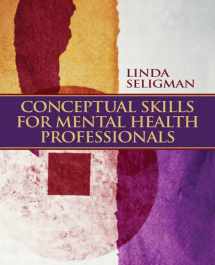
Conceptual Skills for Mental Health Professionals
Book details
Summary
Description
This book is designed to help students in the mental health professions, as well as clinicians, to bridge the gap between theory and practice and to develop competence in the conceptual skills of their profession. Written by a well-known author who is an educator as well as a practicing clinician, this book teaches the conceptual skills that mental health professionals need to understand their clients; to develop sound ideas about the cause, nature, and purpose of their clients' difficulties; and to craft a treatment plan that is likely to be effective. Skills are organized into a readily comprehensible structure and are grouped by their primary focus (background, emotions, thoughts, or actions), thus clearly linking theory and practice. Important skills presented in this book include developing a sound therapeutic alliance, case conceptualization, assessment, becoming competent in diagnosis and treatment planning, and addressing transference and countertransference. Written exercises, discussion questions, group role-plays, personal journal questions, and many examples facilitate learning and application.
Highlights of this First Edition:
- The structure of BETA (background, emotions, thoughts, actions) format-enables readers to link theory and practice and readily understand the primary purpose of each skill.
- Consistent use of four types of learning opportunities at the end of each chapter (written exercises, discussion questions, role-play exercises, personal journal questions)-affords readers diverse approaches to learning, designed to promote skill development regardless of the learner's preferred learning style. Gives structure and consistency to the book.
- The teaching of advanced conceptual skills-until recently, skill development in the training programs in counseling, psychology, and social work focused almost exclusively on teaching the basic or fundamental skills. Recent research has affirmed the importance of both fundamental and conceptual skills. This is one of the few books that teaches readers how to understand and think about their clients and potentially moves the treatment process to a deeper and more meaningful level.
- New and revised examples and case studies, including a new intake interview in the concluding chapter of the book-new and revised case studies reflect typical clients and concerns currently encountered by mental health professionals. Clients and concerns reflect multicultural diversity as well as a range of problems.
- This book presents a variety of models for conceptualizing clients and their difficulties. Models include a modified version of Bloom's Taxonomy, Concept Mapping, Clinical Factor Analysis, the Inverted Pyramid Heuristic, and others-this variety of models affords readers experience in various ways to approach the conceptualization process and enables them to identify a model that seems most useful to them.


We would LOVE it if you could help us and other readers by reviewing the book
Book review





